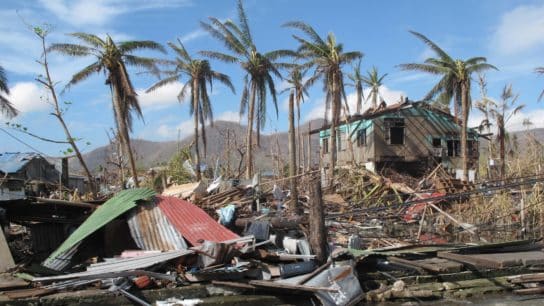“The impacts of climate change are here and are being felt all over the world, but most acutely by those nations who are least equipped to deal with it – and have done least to cause it,” writes Kristian Teleki.
—
The reality of climate and biodiversity loss is a topic we are becoming all too familiar with. We cannot adapt to and mitigate climate change without the help of nature, but we also cannot halt the loss of nature if we cannot slow down climate change.
This latter point was brought to a stark reality this week as we witnessed the devastation of so many islands across the Caribbean. Homes have been destroyed, ecosystems have been torn apart and lives have been lost. Climate change is here, and it is having a catastrophic impact on our staff, partners, their communities and the nature they are working so hard to protect.
Much of Fauna & Flora’s Caribbean island work focuses on the restoration of natural ecosystems – including coral reefs and vegetation – to make islands more resilient to climate change. Coral reefs and other coastal ecosystems help to dissipate the energy of waves as they attack the shoreline. The healthier – and therefore more robust – the coral reef, the more wave energy it can dispel.
But, the impact of this restoration work is limited when it is knocked ten steps backwards due to the consequences of climate change. And it’s not just worsening storms. Rising sea temperatures are destroying coral reefs; reducing their ability to provide a habitat for nature, to capture carbon, and to provide that ever-critical flood defence when storm season inevitably arrives. It’s a downwards spiral that will only get worse without coordinated, targeted action.
Hurricane Beryl is just the beginning – climate change makes hurricanes more frequent and more destructive. This is the earliest Category 5 Atlantic hurricane on record. So, it’s highly possible that there may be more, perhaps worse, to come over the coming weeks.

In the past few months, I have heard more and more sentiments that the goal to nearly halve emissions by 2030 and then reach net zero by 2050 is too ambitious. This is utterly ridiculous. The events of this week – and frankly of the last 12 months – have shown that the 2050 goal is not ambitious enough. We are also not taking adaptation work seriously enough, nor it seems emissions cuts, with Google’s emissions climbing nearly 50% in the last five years, for example. The impacts of climate change are here and are being felt all over the world, but most acutely by those nations who are least equipped to deal with it – and have done least to cause it.
At the recent UN Summit for Small Island Developing States, Antigua and Barbuda Prime Minister Gaston Browne said that the current climate pledges were “empty” and “grossly inadequate”, and accused wealthy nations of failing to meet obligations to limit damages from carbon emissions. A sentiment that was starkly brought home this week.
It is clear that we are now at a point now where we simply do not have time to keep talking about what we are going to do to solve the climate and biodiversity loss crises. We need stronger action and stronger leadership now.
Perhaps at this point I should come up with a clever innovative solution, or something new and provocative. But we know what we need to do – as a global community, as business leaders, as governments, as people who live on this planet – we need to reduce emissions fast, faster, as fast as is justly possible. And we need to do what we can to help those communities like those on Union Island who are in the frontline of the devastation caused by climate change.
As we enter another end of year cycle of more conferences, more discussions around how we tackle the global climate and nature crises, we urge leaders to remember that the clock is ticking very loudly. Time is now a commodity even more scarce than money. While we sit around the table, deforestation is accelerating, new global temperature records are being set, species are going extinct, economies are being destroyed and lives are being lost.
If we delay any longer, we won’t have a planet left to squabble over.
If you can, donate to the Union Island Environmental Alliance (UIEA) today and help them rebuild their lives and livelihoods and rescue Fauna & Flora’s conservation programme.
Featured image: Times Caribbean.















